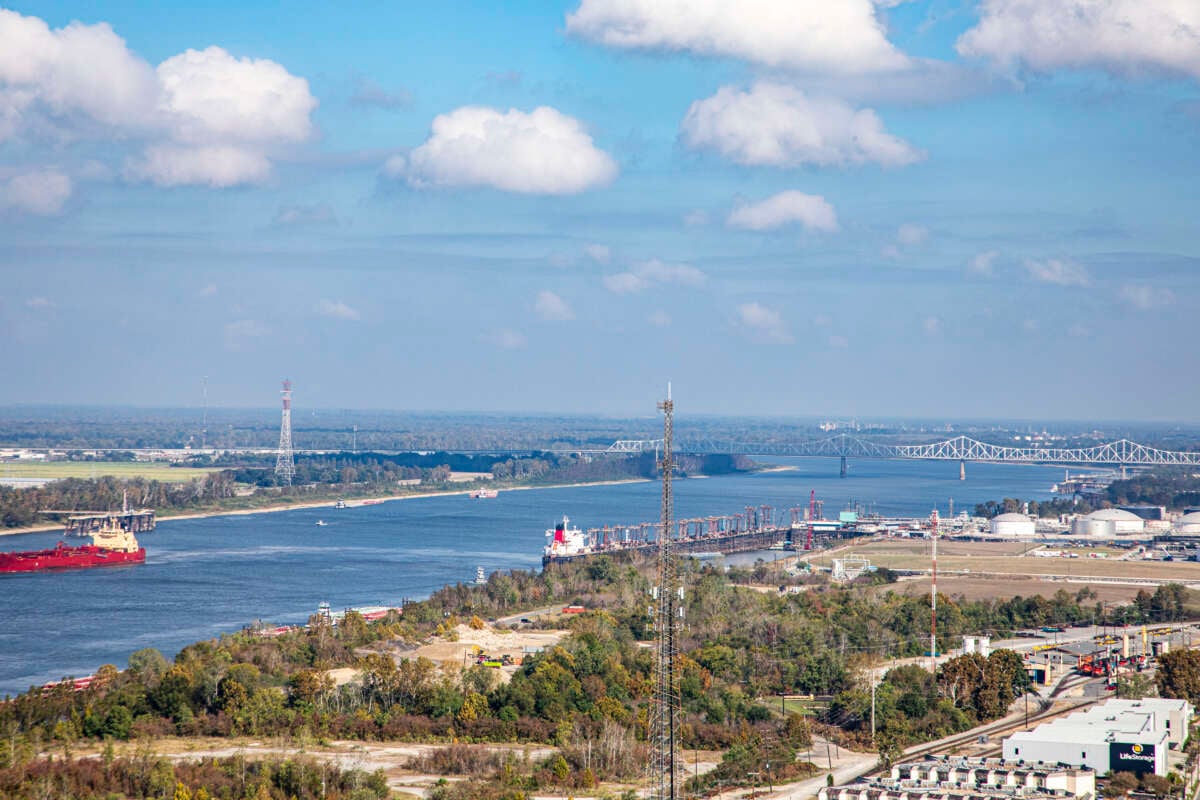Environmental groups are claiming victory after Mitsubishi Chemical Group dropped plans for a $1.3 billion plant in the heart of Louisiana’s industrial corridor.
In the works for more than a decade, the chemical manufacturing complex would have been the largest of its kind in the world, stretching across 77 acres in Geismar, a small community about 60 miles west of New Orleans. Tokyo-based Mitsubishi cited only economic factors when announcing the cancellation last week, but a recent report on the plant’s feasibility noted that growing community concern about air pollution could also hamper the project’s success.
“The frontline communities are fighting back, causing delays, and that amounts to money being lost,” said Gail LeBoeuf with Inclusive Louisiana, an environmental group focused on the industrial corridor along the Mississippi River known as Cancer Alley.
The nonprofit group Beyond Petrochemical declared the project’s failure a “major victory for the health and safety of Louisianans.”
According to Mitsubishi, the plant could have produced up to 350,000 tons per year of methyl methacrylate, or MMA, a colorless liquid used in the manufacture of plastics and a host of consumer products, including TVs, paint, and nail polish.
The plant was expected to be a major polluter, releasing hundreds of tons per year of carbon monoxide, nitrogen oxides, volatile organic compounds, and other harmful chemicals, according to its permit information.
Mitsubishi cited rising costs and waning demand for MMA as the reasons for dropping the project. In a statement, the company indicated the plant likely wouldn’t have enough MMA customers to cover “increases in capital investment stemming from inflation and other factors.”
In July, a report on the plant’s viability warned that a global oversupply of MMA and fierce local opposition made the project a “bad bet.”
Conducted by the Institute for Energy Economics and Financial Analysis, the report said that credit agencies are paying more attention to “community sentiment” about petrochemical projects, particularly in Louisiana. In Geismar and other parts of Cancer Alley, there’s a “disproportionately heavy concentration of polluting industrial facilities” and Mitsubishi could become “entangled in a decades-long dispute involving issues of racial inequality and environmental justice,” the IEEFA report said.
Geismar residents are surrounded by about a half-dozen large chemical facilities that emit harmful levels of air pollution. Of the more than 6,000 people who live within the 3 miles of the planned project site, about 40 percent are Black or Hispanic, and 20 percent are considered low-income, according to federal data.
“The air here is already so dirty that the kids can’t play outside anymore,” said Pamela Ambeau, Ascension Parish resident and member of the group Rural Roots Louisiana.
The proposed plant is the latest in a string of failed industrial projects in Cancer Alley. Since 2019, local activism was instrumental in halting the development of two large plastics complexes in St. James Parish and a grain export terminal in St. John the Baptist Parish. All three projects would have been built in historically Black and rural communities.
Mitsubishi’s project had the strong backing of Louisiana political leaders. In 2020, then-Governor John Bel Edwards, a Democrat, praised the project as a “world-scale” chemical manufacturing facility that would create “quality jobs.”
Louisiana Economic Development predicted the plant would create 125 jobs with an average salary of $100,000 and another 669 “indirect jobs” in the region.
The state agency began courting Mitsubishi in 2016, offering the company worker recruitment and training assistance and a $4 million grant to offset construction costs.
In 2021, Mitsubishi applied for property tax abatement via the state’s Industrial Tax Exemption Program, or ITEP. The tax relief, which Louisiana has granted to several similar projects, was pending the plant’s construction and would have saved the company an estimated $17 million in its first year, according to LED.
The first of a series of project delays began in 2022 due to what Mitsubishi called “market volatilities.”
Mitsubishi appeared to be betting on generous state subsidies “while ignoring the larger financial landscape,” said Tom Sanzillo, author of the IEEFA report.
The combination of sustained market weakness and strong public opposition “erased the potential benefits they are counting on,” he said.
This article originally appeared in Grist at https://grist.org/equity/mitsubishi-cancels-plans-for-a-1-3-billion-chemical-plant-in-louisianas-cancer-alley/.
Grist is a nonprofit, independent media organization dedicated to telling stories of climate solutions and a just future. Learn more at Grist.org
Press freedom is under attack
As Trump cracks down on political speech, independent media is increasingly necessary.
Truthout produces reporting you won’t see in the mainstream: journalism from the frontlines of global conflict, interviews with grassroots movement leaders, high-quality legal analysis and more.
Our work is possible thanks to reader support. Help Truthout catalyze change and social justice — make a tax-deductible monthly or one-time donation today.
